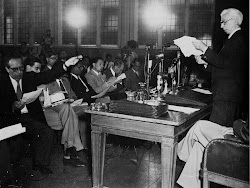Today we learn the sad news of the death of Raymond Aubrac, a leader of the French resistance who became involved with a little known 1967 Pugwash backchannel initiative on Vietnam (code named PENNSYLVANIA by the US). This initiative involved Henry Kissinger, Ho Chi Minh (with whom Aubrac was friends), the late Pugwashites Herbert Marcovich and Robert McNamara, and others (including President Johnson).
I include below a brief excerpt of a 2004 interview I conducted with Aubrac, which focuses on why Aubrac accepted to get involved with the Pugwash initiative, and what his assessment was of the impact. One can perhaps begin to get a sense of the man from these excerpts.
Q: "Why did you agree to do this with Pugwash when in the past others asked you to get involved and you declined?"
A: “Any person would have gotten involved at that time. Any normal individual would have accepted. Of course I was very much impressed by that meeting [with Pugwashites]. So the real reason why I accepted was that I considered myself as a normal person.…
“In other visits to Vietnam, I had many occasions to see Pham Van Dong. Not between 67 and 75, but after 75. He has always told me that the PENNSYLVANIA business would have succeeded if it had taken place one year before. I think he was right. So our Pugwash friends woke up too late. That’s true of the atom bomb as well. If they had taken that decision two or three years before, the world would have been different….”
“It was one good chapter in my life. I have several of them as you may know. That one was interesting, very interesting.”
McNamara himself credited this initiative with laying the groundwork for the San Antonio accords, “the foundation for the start of the negotiations between North Vietnam and the U.S. in Paris.” According to Nguyen Khac Huynh, this was a shared assessment from the Vietnamese side: “[PENNSYLVANIA] gave tremendous support and encouragement to those of us who were at that moment working on a negotiating strategy. We were very encouraged….PENNSYLVANIA succeeded several months after it was initiated, because it provided the basis for beginning the Paris peace process. There is your answer. Our ears were not ‘deaf.’ We ‘heard’ you. And we gave you our answer after Tet.”
And yet, sadly, for a series of complicated reasons, the initiative failed in immediate terms. McNamara later wrote, “…military forces under Hanoi’s command…had by 1968 suffered a half-million killed in battle…They would by 1975 lose somewhere between 2 million to 3 million more. The United States had lost 19,562 killed in battle by December 31, 1967. Ultimately, 58,169 Americans would lose their lives in the war. This means the vast majority of war-related fatalities on both sides occurred after the failure of PENNSYLVANIA, which was the last serious attempt before the Tet Offensive to move to negotiations. In other words, even if Washington and Hanoi had failed in face-to-face talks time and again, yet had been able to move to negotiations by late 1967, most of those killed in the war would have been spared."
In contemplation of the missed opportunities for negotiations in 1967, McNamara had some words which might be relevant for today's world. He wrote, "Skeptics will say...that our very failure to move to negotiations proves ...that it couldn't have been done. I disagree totally with this point of view. Missed opportunities proliferated. Mistakes were made that were preventable....William James recorded in his journal on April 30, 1870: 'My first act of free will will be to believe in free will.' He then gives himself some advice: 'Care little for speculation,' he says, and 'much for the form of action.' This is also good advice for anyone wishing to lower the risk of such tragedies as the Vietnam War occurring in the twenty-first century."
There is not space here to give a complete history of the Vietnam initiative, but I did want to take this opportunity to note what was an important moment in Pugwash history. Part of the story lies in each side trying to send signals that were missed or not understood by the other side.
With appreciation and respect for the efforts of Raymond Aubrac and Herbert Marcovich, who travelled to Hanoi with a hope for peace....
Raymond Aubrac's autobiography, Ou la memoire s'attarde contains information about this initiative.


